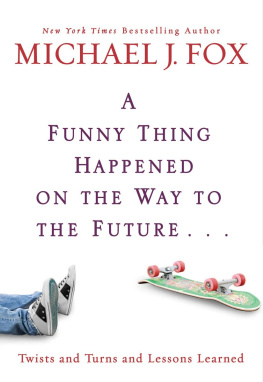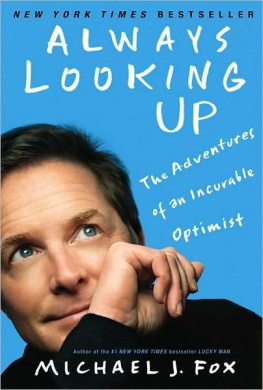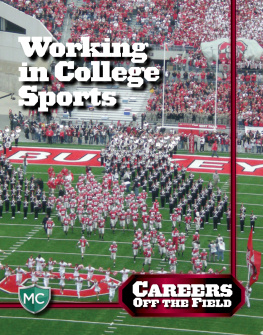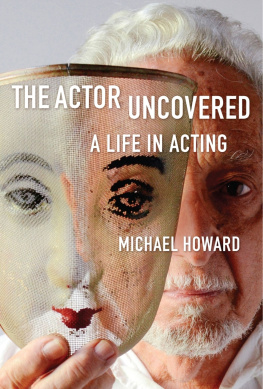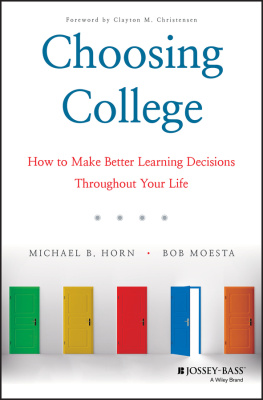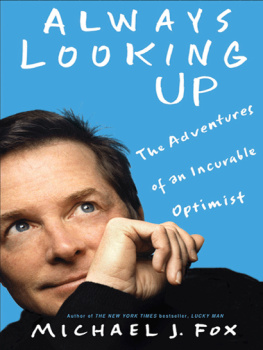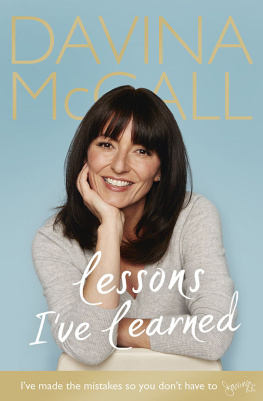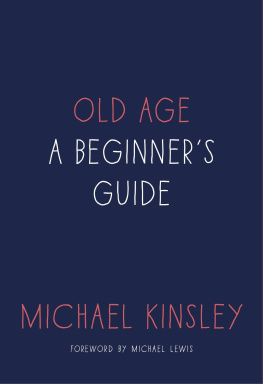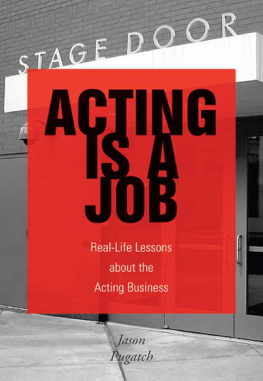A Funny Thing Happened on the Way to the Future
Twists and Turns and Lessons Learned
Michael J. Fox

For all of my teachers.
Contents
MY PURPOSE IN WRITING THIS BOOK IS NOT TO OFFER advice. Sure, I make the occasional suggestion, mostly common sense stuff. If it works, feel free to work it, though chances are youll figure this out on your own. If anything, this is a book that tells you that you dont need a book. That is, you dont need a book to tell you what you need. What Ive done here is draw a few observations based on my life experience and organize them in response to the broader question: What constitutes an education? Have the last dozen-plus years prepared you for the future? Obviously, thats impossible for you or anyone to know. I could spend five months poring over your transcript and I still wouldnt be able to predict what the next five minutes have in store. Life is a ride. Strap in, hang on, and keep your eyes open.
A friend of mine shared this story with me. Its a parable, origin unknown, and I found resonance in its simple truth.
A PROFESSOR STANDS before his class with a cardboard box. From inside he produces a large, clear, empty pickle jar, and then a series of golf ball-sized rocks, which he then drops one by one into the jar until they reach the brim.
So? the teacher asks. Who thinks the jar is full? Hands shoot up, and a quick scan of the room confirms unanimityyes, its full.
Next out of the box, a bag of sand, which the professor pours in amongst the rocks. Tiny grains cascade over, around, and in between the larger stones until there is no space left.
Is it full now? A show of hands and a chorus of voices respondsyes, its full.
Now the professor smiles. But wait. Both hands disappear into the box and reemerge simultaneously, each holding a can of beer. The crack and hiss of the pop tops are drowned out by laughter in the classroom as the amber nectar pours into the jar with the rocks and sand. Once the din of the students subsides to a collective chuckle, the professor confidently declares, Now its full.
This jar represents your life, he continues. Make sure the first ingredients are the big stuffthe rocksyour family, your work, your career, your passions. The rest is just sand, minutiae. Its in there. It may even be important. But its not your first priority.
What about the beer? a kid in the back yells out.
Well, comes the answer. After everything else, you always have room for a couple of beers with friends.
I THOUGHT ABOUT saving the metaphor of the jar and the stones for the conclusion of this book, but I wanted to pass it on to you as quickly as possible. You now know what it took me decades to learn. Among other things, dont start with the beer.
Let me explain
Ive never let my schooling interfere with my education.
M ARK T WAIN
MY PHOTO APPEARED ON THE MAY 23, 2008, FRONT PAGE of my hometown paper, the Vancouver Sun , but the headline identified me as Dr. Michael J. Fox. As neither I nor my brother, Steve, had ever given our mother any reason to expect that shed someday utter the words my son the doctor, she was immensely proud that the University of British Columbia had pronounced her baby boy a Doctor of Laws.
Would it be crass to mention that I also have a doctorate of Fine Arts from NYU, as well as a doctorate of Humane Letters from Manhattans Mt. Sinai School of Medicine? Theyre honorary, of course, which puts me on equal academic footing with the Scarecrow from The Wizard of Oz .
On that early summer afternoon in Vancouver, Canada, resplendent in my royal blue and crimson ceremonial muumuu and deftly balancing the mortarboard yarmulke atop my bobbling head, I was given the opportunity to address assembled graduates and faculty, families and friends. Just as I had done on previous occasions, when similarly honored, I opened with a question: What the hell were you people thinking? You are aware, I continued, that Im a high school dropout?
Now that you have picked up this weighty tome from your local bookseller, I put the same question to you: What the hell were you thinking? Or, in the likelihood that someone else bought it for you as a graduation gift, you might want to ask them what the hell they were thinking. Not that I dont have some bona fides: I did receive my GED (General Equivalency Degree). I finally put in the effort to achieve this goal at the urging of my son. He was four at the time. Id sit at the dining room table, Sam perched on my lap playing with a plastic dinosaur, while a math tutor schooled me in the finer points of the Pythagorean theorem. And so, at the tender age of thirty-two, with my son registered to begin kindergarten the next fall, I applied to take the test that would make me, for all intents and purposes, a high school graduate.
But that was 1994, approximately fifteen years after I left high school in the eleventh grade. In the intervening decade-and-a-half, I had been alternately fortunate and unfortunate enough to receive an amazingly comprehensive education, albeit unstructured, and often unbidden. Life 101.
Some lessons, of course, are more appropriate to a certain age or stage of development. For example, my latter teenage years into my early twenties was a time when I was just smart enough to get myself into situations I was still too stupid to get out of. Later, as evidenced by Sams insistence that I finish what I started, I found out there is wisdom that can only come from being old enough to know how much there is to learn from children. And in the time since that milestone, I have remained a humble and grateful student of, if not the School of Hard Knocks, then at least the University of the Universal. I didnt pick my courses; they picked me. And just as there was no formal matriculation, neither was there any graduation. There were, of course, plenty of tests.
Just to reassure you, Im not one of those swaggering jerks who, having achieved success after dropping out of school, promotes the fiction that a higher education is a complete waste of time. All the same, I sometimes employ my lack of academic standing as a subtle goad to those who would make character judgments based solely on ones alma mater or post-graduate degree.
As executive producer of Spin City, I was responsible for hiring and managing an astoundingly bright collection of young comedy writers, many of them graduates from prestigious universities: Dartmouth, Yale, Princeton, and Harvard, to name an ivy-covered few. Inspired by the irony that I was the boss of such a lettered group of individuals, and, honestly, perhaps a little intimidated, I thought Id have some fun with it. I amassed a collection of T-shirts from some of the finest schools in the country. Among others, I had a burgundy Harvard tee and a Stanford Cardinal jersey. An old Dartmouth baseball shirt was a personal favorite. Now, I announced to the wunderkinds, assembled for one of our first meetings of season one, if you see me wearing a shirt from your alma mater, say Yale, for example (with this Id sneak a glance at an eager young Eli whose specialty was fart jokes), then that means its your day to get me coffee. Okay, so I am capable of a modicum of swaggering jerkitude.
A scant few minutes of Wikipedic surveying will uncover an impressive roster of well-known people, in every arena of public life, who have attained success and recognition without ever having graduated from high school. Those I most relate to are, of course, the actors and entertainers, whose early life experiences were no doubt similar to my own, propelled by a common group of neuroses toward careers in show business. These include such estimable personages as Leonardo DiCaprio, Johnny Depp, Robert De Niro, Chris Rock, Kevin Bacon, John Travolta, Hilary Swank, Jim Carrey, Charlie Sheen, Sean Connery, Al Pacino, and Quentin Tarantino.

